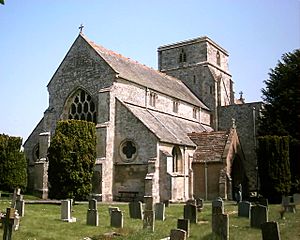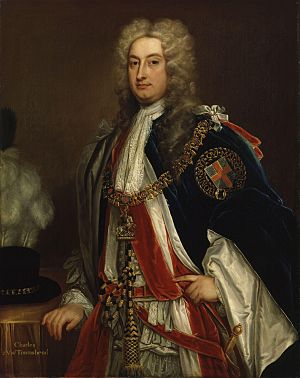Edward Ashe (died 1748) facts for kids
Quick facts for kids
Edward Ashe
|
|
|---|---|

St Peter and St Paul, Heytesbury, where Edward Ashe was buried
|
|
| Board of Trade | |
| In office 1720–1746 |
|
| Clerk of the Ordnance | |
| In office 1714–1718 |
|
| MP for Heytesbury | |
| In office 1695–1747 |
|
| Personal details | |
| Born | 1673 Heytesbury, Wiltshire |
| Died | 22 May 1748 (aged 74) Heytesbury, Wiltshire |
| Resting place | St Peter and St Paul, Heytesbury |
| Nationality | English |
| Political party | Whig |
| Spouse | Frances Luttrell |
| Parents | William Ashe (1647-1713) Anne Popham (1649-1680) |
| Alma mater | Wadham College, Oxford |
| Occupation | Landowner |
Edward Ashe (born around 1673 – died 1748) was an important English landowner from Heytesbury, a town in Wiltshire. He was a Member of Parliament (MP) for Heytesbury for a very long time, serving 52 years from 1695 to 1747.
His family, the Ashes, were well-known in Heytesbury. From 1640 to 1750, someone from the Ashe family almost always represented Heytesbury in Parliament. Edward's grandfather, father, brother, and nephew also served as MPs for the same area.
Edward Ashe was a loyal member of the Whig political party. He supported a famous politician named Robert Walpole. In 1720, Edward was given a position on the Board of Trade, which was a government group that looked after trade and colonies. He held this job until 1746.
He passed away on May 22, 1748. Edward and his wife, Frances Luttrell, did not have any children. His nephew, William Ashe, inherited his family's property and wealth.
Edward Ashe's Family and Early Life
Edward Ashe was the oldest son of William Ashe. His mother was Anne Popham. She was the daughter of Alexander Popham, who was also an MP.
Edward had a younger brother named William (1675-1732). This William also became an MP for Heytesbury. Edward also had a sister, Elizabeth (1682-1768). She married Pierce A'Court. Later, Elizabeth's grandson, William Ashe A'Court, inherited the Heytesbury family estate.
In 1710, Edward Ashe married Frances Luttrell. They did not have any children together.
Edward Ashe's Political Career

Edward Ashe studied at Wadham College, Oxford and finished his studies on April 7, 1690. Soon after, in the 1695 election, he was chosen to represent Heytesbury in Parliament.
His grandfather, Edward, was a rich merchant from London. He bought the Heytesbury estate in 1641. Heytesbury was a "borough," which meant it could send two MPs to Parliament. For many years, from 1640 to 1770, a member of the Ashe family or someone connected to them held these MP positions.
Heytesbury had very few voters, only about 26. This meant that elections were rarely competitive. From 1690 to 1754, only one election was actually fought between different candidates.
The Ashe family were strong supporters of the Whig party. This party believed in a strong Parliament and limited power for the king. In 1696, Edward Ashe voted to punish someone who had plotted against the king.
The Ashe family was quite large and influential. In the early 1700s, Edward and seven other direct relatives were all serving as MPs at the same time. Edward was also related by marriage to Viscount 'Turnip' Townshend. Townshend was a very important Whig politician.
Because of these connections, Edward Ashe held several government jobs. He was the Storekeeper of the Ordnance from 1710 to 1712. This job involved managing military supplies. He lost this job when the Tory party came to power in 1713.
When the Whigs returned to power in 1714, Edward was given a new job as Clerk of the Ordnance. He lost this position again in 1718 when his political ally, Townshend, faced challenges from other Whig leaders.
Eventually, Edward Ashe was appointed to the Board of Trade in 1720. He kept this position until 1746. Even though he held this job for a long time, he didn't play a very active role in its daily work. Because he served in Parliament for so many years, he briefly became the Father of the House. This is a special title given to the MP who has served the longest without interruption.
Edward Ashe resigned from his government roles in 1746 due to poor health. He died on May 22, 1748, and was buried at St Peter and St Paul church in Heytesbury.
Images for kids
 | Percy Lavon Julian |
 | Katherine Johnson |
 | George Washington Carver |
 | Annie Easley |



